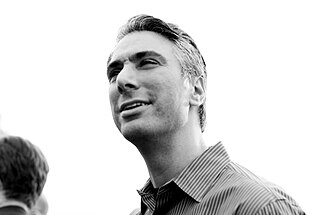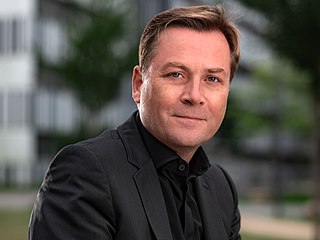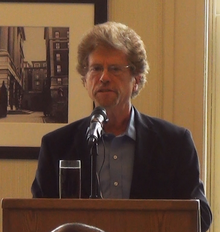
The National Telecommunications and Information Administration (NTIA) is an agency of the United States Department of Commerce that serves as the president's principal adviser on telecommunications policies pertaining to the United States' economic and technological advancement and to regulation of the telecommunications industry.

Juliette Powell is an American-Canadian media expert, tech ethicist, business advisor, author and beauty pageant titleholder who was crowned Miss Canada 1989, the contest's first Black Canadian winner.

The Open University of Catalonia is a private open university based in Barcelona, Spain.
Dallas Walker Smythe was a political activist and researcher who contributed to a political economy of communications. He believed that research should be used to develop knowledge that could be applied to policies in support of public interest and the disenfranchised in the face of private capital. He focused his research on mass media and telecommunications. Some of his main ideas included the "invisible triangle", and the "audience commodity". Much of his effort was focused on differentiating between Administrative and Critical Communications research.

The James H. and Mary B. Quello Center for Telecommunication Management & Law is a research center at Michigan State University in East Lansing, Michigan. Part of the Department of Media and Information at the College of Communication Arts and Sciences, the Quello Center is dedicated to original research on issues of information and communication management, law and policy. It is named for former Federal Communications Commission chairman James H. Quello.

Johannes M. Bauer is the Quello Chair for Media and Information Policy in the Department of Media and Information at Michigan State University, East Lansing, Michigan. He also serves as the Director of the James H. and Mary B. Quello Center at Michigan State University.
There are several approaches to defining the substance and scope of technology policy.
The Columbia Institute for Tele-Information (CITI) is one of several research centers for Columbia Business School, focusing on strategy, management, and policy issues in telecommunications, computing, and electronic mass media. It aims to address the large and dynamic telecommunications and media industry that has expanded horizontally and vertically drive by technology, entrepreneurship and policy.

Charles Peter Mok, JP is a Hong Kong–based Internet entrepreneur and IT advocate who formerly represents the Information Technology functional constituency on the Hong Kong Legislative Council.

Kevin Werbach is an American academic, businessman and author. In 2002, he founded the Supernova Group, a technology analysis and consulting firm. Since 2004, Werbach is an Associate Professor of Legal Studies and Business Ethics at The Wharton School, University of Pennsylvania. He writes about business, policy, and social implications of emerging Internet and communications technologies.
Damian Tambini is a senior lecturer at the London School of Economics, and an associate fellow at the Institute for Public Policy Research (IPPR) and the Oxford Internet Institute. He is also a Fellow of the Royal Society of Arts and serves on the advisory Groups of the Oxford Media Convention and Polis. He also teaches for the TRIUM Global Executive MBA Program, an alliance of NYU Stern, the London School of Economics and HEC School of Management. Damian Tambini is on the Advisory Board of the Center for International Media Ethics.

Sonia Livingstone is a leading British scholar on the subjects of children, media and the Internet. She is Professor of Social Psychology and former head of the Department of Media and Communications at the London School of Economics and Political Science. While Livingstone’s research has evolved since the start of her career in the 1980s, her recent work explores media and communication in relation to society, children and technology. Livingstone has authored or edited twenty-four books and hundreds of academic articles and chapters. She is known for her continued public engagement about her research areas and has advised the UK government, European Commission, European Parliament, UN Committee on the Rights of the Child, OECD, ITU and UNICEF, among others, on children’s internet safety and rights in the digital environment. In 2014, Livingstone was awarded the title of Officer of the Order of the British Empire (OBE) "for services to children and child Internet safety".

Harvey Joshua Levin was an American economist. He was university research professor in the Department of Economics at Hofstra University (1989–92), Augustus B. Weller Professor of Economics at Hofstra (1964–89), and founder and director of its Public Policy Workshop (1975–92). He had previously served as professor at Columbia University. He was also a senior research associate at the Center for Policy Research.
Nicholas Economides is an internationally recognized academic authority on network economics, electronic commerce and public policy. His fields of specialization and research include the economics of networks, especially of telecommunications, computers, and information, the economics of technical compatibility and standardization, industrial organization, the structure and organization of financial markets and payment systems, antitrust, application of public policy to network industries, strategic analysis of markets and law and economics.
Information policy is the set of all public laws, regulations and policies that encourage, discourage, or regulate the creation, use, storage, access, and communication and dissemination of information. It thus encompasses any other decision-making practice with society-wide constitutive efforts that involve the flow of information and how it is processed.

Viktor Mayer-Schönberger is Professor of Internet Governance and Regulation at the Oxford Internet Institute, University of Oxford. He conducts research into the network economy. Earlier he spent ten years on the faculty of Harvard's John F. Kennedy School of Government. He is the co-author of Big Data: A Revolution That Will Transform How We Live, Work, and Think and author of Delete: The Virtue of Forgetting in the Digital Age, which won the 2010 Marshall McLuhan Award for Outstanding Book and the 2010 Don K. Price Award for Best Book in Science and Technology Politics, and has written over a hundred articles and book chapters. He is a member of Germany's Digital Council, advising Angela Merkel and her cabinet.
Stephen Messer is an American Internet entrepreneur, inventor and investor who has founded several global businesses, most notably LinkShare and Collective[i]. Messer served as LinkShare's CEO and chairman of the board, helping to create the sector of online marketing commonly referred to as affiliate marketing. Under his leadership, LinkShare expanded its network of websites to become one of the largest of its kind with its global reach extending from the United States to Japan, Canada and Europe. Messer was a board member of both LinkShare and LinkShare Japan until 2006.

Oliver Günther is president of the University of Potsdam and former president of the German Informatics Society (GI).
Phil Venables is a computer scientist who has been the chief information security officer (CISO) at Google Cloud since 2020. He specializes in information and cyber security, as well as enterprise risk and technology risk. Previous to Venables's position at Google, he held a number of roles at Goldman Sachs and served on the Board of Goldman Sachs Bank. Since 2021, he has also been a member of the President’s Council of Advisors on Science and Technology (PCAST).
Jeffrey I. Cole is a media analyst and Research Professor in the Annenberg School for Communication and Journalism at the University of Southern California. He is the Founder and Director of Center for the Digital Future and the World Internet Project, the longest-running study of the impact of digital technology on users and non-users.











